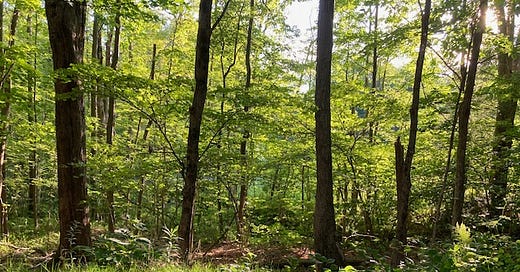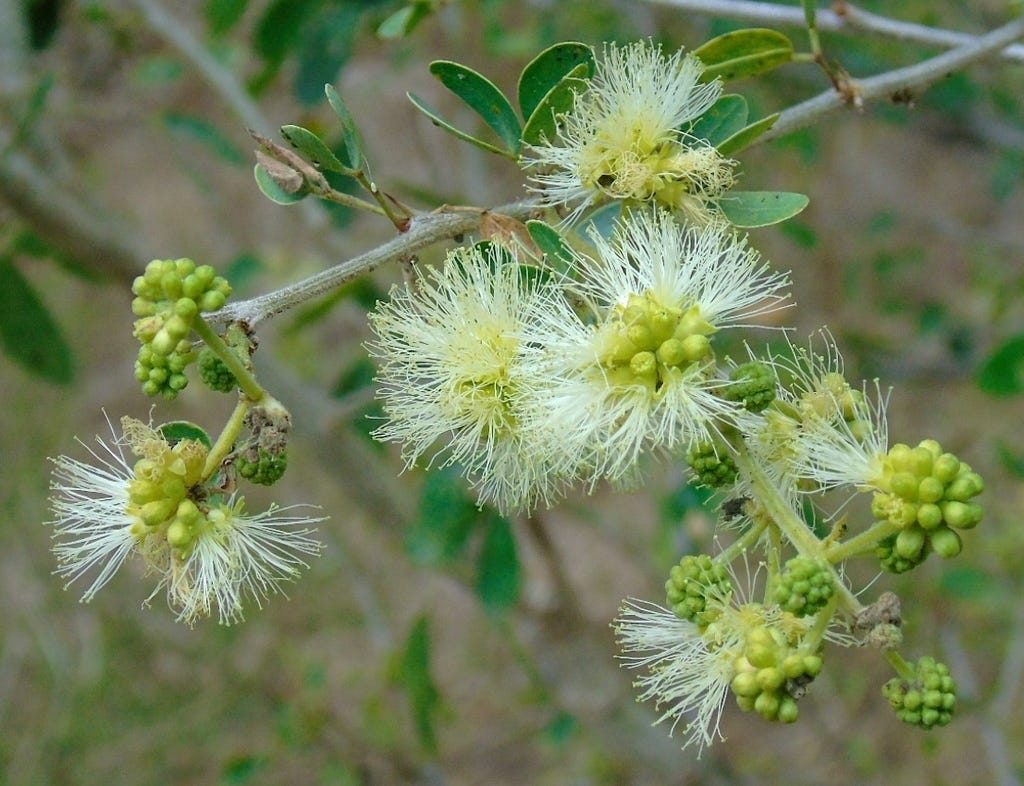28 MAY—Among my earliest and most enduring memories are those of trees. What I remember are the ways in which they defined and enclosed space such that I felt I was in a living, breathing sanctuary (although I didn’t know that word yet) made of light and shadow, the movement of wind, and the sound of birds—all of which resonated with my young child’s mind and body in a way that going to church on Sundays did not.
My experience among trees has always been one of wonder, of feeling at once at home and in the presence of something sacred. It occurs to me only now that perhaps for some people trees do indeed bring us home, back to ourselves, which is to say that they reconnect us with our sacred selves.
Our hacienda in Mexico is overarched by two large guamúchil trees, cuauhmochitl in Nahuatl, the indigenous language. I am not inclined to complain about trees: They are, after all, quite literally our ancestral home. But the guamúchil is without doubt the messiest tree I have ever become acquainted with.
For four months out of the year they drop a ceaseless confetti of pollen-laden “blossoms” the size and shape of cotton balls—and with no more aesthetic appeal. As the nascent fruit begins to develop, the trees rain a sugary sap for two weeks that coats everything, sticks to the bottoms of shoes, and attracts ants. By late April, with the guamúchil fruit finally ripe, long curly pods begin to fall. Throughout the year, leaves and thorny branches pile up in our courtyards, blown to earth by the ever- present winds of Lago de Chapala. Adding to that, the countless birds that live and nest overhead leave their own mess: pajara caca, to use the Spanish.
But however much I complain, and I do rather often, I am fond of these trees. The fruits are delicious—and surprisingly rich in vitamins and minerals. Honey bees swarm the guamúchiles when they’re pollinating; the many birds that live among their branches provide us with an avian chorus from sunup to sundown; the ample shade they bestow makes the hot season bearable. I wouldn’t want to live without these giant compadres.
In so many ways trees have shaped human development—habitation, culture, cuisine, spirituality, medicine, and more. It is no exaggeration to assert that throughout our evolution and history trees have exerted a profound influence on who we are as a species. In a sense, they have made us more human.
It is another altogether different “tree” that I have been pondering and wondering how to write about. When exactly did the telephone tree first make its appearance? I don’t recall. They have been around for at least the past two decades and are now ubiquitous.
Interactive voice response systems, IVRs, are becoming ever more sophisticated and ever more adept at funneling people deeper into automated customer service programs and away from the possibility of contact with an actual living, breathing person. From the local food cooperative, to the hardware store, to international corporations, when dealing with any type of business, it’s impossible to avoid the dark and perilous forest of telecommunication trees.
There was a time when it was fairly easy to get around this diabolic and alienating technology. A numeric option was provided to direct you to a person allowing you to skip the time-consuming, tedious, and usually pointless process of listening to the entire tree. Alas, that is no longer the case. Indeed, you are meant to be entangled in the IVR system for as long as possible. IVRs exist primarily to maximize profit by eliminating jobs—there are fewer and fewer actual people available on the other end of the phone for you to talk with. You are not meant to interact with another person. You aren’t allowed to.
Five days ago I had reason to call FedEx. They had, for the second time in seven months, lost an expensive package that could not be tracked because a driver had failed to scan the barcode. My interaction with “customer service” has probably reduced my life expectancy by several months.
No actual customer service was provided. Every option I was given proved futile. “I’m sorry,” the saccharine female voice informed me, “you have not provided a valid tracking number. Goodbye.” In actual fact, I had provided a valid tracking number. It just hadn’t been entered into their system.
By the end of fifteen agonizing minutes I had lost count of the number of times I’d been hung up on. The telephone tree didn’t work. And why not? Because I had a problem it couldn’t address. Because no artificial intelligence is actually intelligent. Not in the way a human being is, full of the intelligence of understanding, kindness, empathy, adaptability, and creative problem-solving skills.
In a blaze of insight I saw something important, something that is being done to all of us and that most of us aren’t even aware of: I was being groomed, trained like a dog to be passive, to acquiesce, and even to feel despair. It was as if I was being told, “Get used to it. There’s nothing you can do. You have no power.” You can’t stop your government from escalating a war that might turn nuclear, you can’t stop global warming, you can’t stop even a machine from hanging up on you. Like an abusive parent smiling all the while hitting a child and telling her: “I’m spanking you for your own good.”
I greatly miss the various customer service and technical support people I used to talk with on the phone. It was a point of human contact in an increasingly dehumanized world. Technology is changing us on the deepest levels as it alters our relationships with each other and the planet itself.
I share this insight because it’s ever more important that all of us hold onto our humanity. Your smile—the smile you share with strangers—the smile you willingly bestow in absolute generosity upon others simply because you recognize your shared humanity—is one of your most powerful assets in the effort to maintain and nourish what is best about you. It is imperative that each of us resists everything in this culture and time that would deprive us of our dignity. Each one of us must honor our absolutely unique intelligence, an intelligence that no machine can replicate.
If it gets overwhelming, if you find your blood pressure rising, should you feel unbearable sadness, or, like me, find yourself screaming obscenities at a machine: Go outside and sit beneath a tree. Put your bottom on the ground, lean your back against the trunk, and listen to the birdsong. Let the beautiful green world wash over you, and remember who you are.






Beautiful story, Cara. It reminds me of my childhood memories growing up in New Jersey (in a big city) and how I would create stories about living in the woods, amongst the trees, birds, deer, and the other wildlife plus the vegetation, and pretend I was one of the characters in my favorite author at the time, James Fenimore Cooper, reading the children's version (from the public library) of the Leather Stocking Tales.
The sounds of Nature have a melody all their own, and in the silence, they come alive for those who want to hear and have a personal communion with. A tranquil and satisfying experience, at least for nature lovers and admirer the "music of the spheres."
So much wilderness is gone now, with man-made structures of all sorts and roads and interstate highways for the ever expanding human population. Years ago, my wife and I would look out the window and every month or so see one or two coyotes walking behind our place in search of food. About three years ago, the city started cutting many of the trees and bushes which was a natural wall blocking the vision from the street and a sanctuary for birds and other critters to nest and sleep. Since then, I've seen two coyotes in the past two years, as they cut so many acres of trees and bushes for new expensive homes and apartment complexes. it has to be an ordeal for the wildlife to find safe "sleeping quarters" and all. Maybe the world is over-populated. For the sake of the planet and posterity, there must be large sections of land , all over the world, left untouched, in my opinion. It's not rocket science.
Peace & Harmony,
Frank
Remarkable. I have the same thing for trees – there's a reason I live in a forest. I remember my very earliest memories in Manchester Conn. My father was in Korea in the war and my mother and I stayed in Manchester where all the rest of my family was and behind my grandparent's garden apartment the ground rose sharply about 3 feet and then became flat. Off to the left was a communal clothes line but directly behind the apartment and off to the right down the line of apartments were nicely spaced, immense oak trees. These behemoths were all at least three foot in diameter. I would go up there and sit behind a tree facing away from the line of apartments and I would be invisible. It was grassy and you could be silent and just listen to the birds and the chitter of the squirrels and the sigh of the wind in the trees. The sad thing is that 50 years later in 2000 I brought my wife and youngest daughter to Manchester after I had been gone for some 30 years and I took them to the places I used to habituate. The communal clothes line and all the trees were gone. It broke my heart.